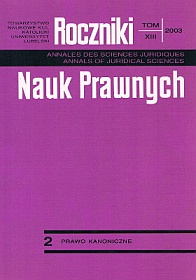The Drawbacks of the Church Administrative Acts as a Result of a Diocesan Bishop’s Omission of the Opinion or Consent of Church Organs
Abstract
The paper sought to discuss the drawbacks of church administrative acts when a diocesan bishop fails to ask about the opinion or consent on the part of collegiate consultatory organs in the circumstances in which the law obliges him to abide by this procedure A discussion of such drawback has been preceded by a characterization of the concept of church administrative act, its constitutive elements, and consultatory collegiate organs in a particular Church. A diocesan bishop is obliged to ask for their opinion or consent before issuing particular acts. The procedure consists of three stages: assembly, sitting, and voting. Then it has been discussed what the drawbacks of an administrative act are, those that are based on the requirements of legality and confidentiality. Taking into consideration the above criteria, administrative acts have been divided into the following: legal and illegal, correct and incorrect with regard to their content. Having listed all the situations in which, prior to issuing administrative acts defined by the law, the author is obliged to consult with collegiate organs defined by the law and obtain their opinion or consent, some drawback have been discussed which may arise on the part of a diocesan bishop or consultatory organs.
Copyright (c) 2003 Roczniki Nauk Prawnych

This work is licensed under a Creative Commons Attribution-NonCommercial-NoDerivatives 4.0 International License.


